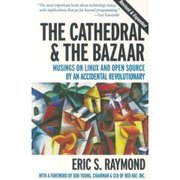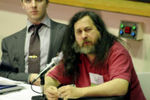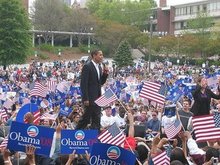Following is the essay you can designate as Volume 10, Number 20 of This Week’s Clue, based on the e-mail newsletter I have produced since March, 1997. It would be the issue of May 14.
Enjoy.
When I first started writing about Political Philosophy on this blog, a little over a year ago, I summed up what I was talking about with one word consensus.
Later I described what I was talking about as an open source thesis, but no one seemed to understand what I was getting at. So lately I’ve switched to calling what I’m talking about the Internet Thesis, a political myth based on the values of the Internet.
But I was being more accurate the first time.
Because it’s open source that is the real economic revolution of our time. Open source transforms market relationships between vendors and customers, between employer and employee . By placing source code in a commons, it gives the customer the power to walk away from the vendor, and the employee the power to walk away from the employer.
Open source is a decade-old concept which first came to prominence through the publication of The Cathedral and the Bazaar by Eric Raymond.
Raymond is not a revolutionary. He’s a Republican. (He’d probably say he’s a libertarian– same thing.) On the other hand Richard Stallman, who created the original GPL, is a revolutionary and hates this term open source which Raymond helped spawn. He demands we use Free and Open Source Software (FOSS) instead. Anyone who associates Stallman’s name with open source anywhere on the Internet quickly gets a firm letter from him or one of his many friends demanding that it be changed.
It’s ironic then that, as the open source movement inspired by Raymond has moved forward, vendors have been increasingly pushed toward Stallman’s GPL license for their software. As I have written, the GPL sits at the bottom of the open source incline. The GPL assures the maximum community contribution to a project, thus the greatest development speed. When your rights as a contributor are equal to those of the vendor who launched the project, you’re far more likely to participate.
Thus despite their best efforts Raymond and Stallman remain connected, joined at the hip despite themselves. Because Raymond’s modest proposal truly goes against over 100 years of American business tradition. It makes Stallman’s revolution a market reality.
That tradition, which began in the 1890s, is that copyright and patent rights are usually held by companies, not individuals. Movies and cars are too expensive to make for it to work any other way, we’re told. In his book 1898: The Birth of the New American Century, David Traxel does a brilliant job of explaining how this came about.
Mass production spurred mass consumption, it created the whole idea of the consumer. The price was, for most, their individuality. The craftsman became the factory worker. The artist became the copyrighter. Only the visionary at the top of the tower was truly free, subject only to the laws of the market, which could still lay him low if he failed to understand its needs.
Factories have dominated our lives ever since. We moved from production factories to offices, but everything was still done in a factory setting, in a factory way. Hundreds of animators and other artists worked on Walt Disney’s Snow White, but it was Walt Disney’s Snow White.
The software business worked this way, too, for a generation before Stallman and Raymond came along. Stallman challenged the whole concept, Raymond showed how it could be overthrown. A decade later this big bang concept is expanding, in every direction, because the Internet makes the older way of doing business inefficient, and in the market, efficient always wins.
The market implications of open source are enormous, but the political implications are larger still.
Where the proprietary model demanded a boss who acted as a King, a single heroic entrepreneur whose vision was true winning the market and leaving a great institution in his wake, the open source model refutes this. The boss no longer owns the product of everyone’s work. He has to negotiate, both within and without. He has to continuously earn the loyalty of employees and customers alike, constantly convincing both that they’re better off investing in this direction rather than taking their balls and going somewhere else.
Now, because the Internet accelerates change so dramatically, combining all aspects of Moore’s Law, this decade-old business concept is now the main alternative to politics as usual.
And itâs ready to take command. Already Barack Obama has chosen the word consensus as his campaign theme. He has placed a toe into the open source waters, and has been bathed in love as a result.
The reason for this is simple. Young voters who have grown up in and around the Internet understand open source, they expect those values in their lives, and they are finally hearing something they understand, as against the culture war which TV has given us for 40 years.
What might happen if he, or someone else, got all the way in?













